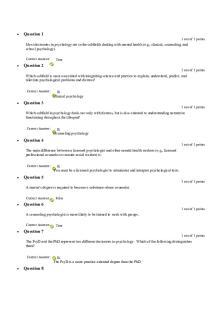Quiz 2 PDF

| Title | Quiz 2 |
|---|---|
| Course | Introduction to Comparative Politics |
| Institution | Concordia University |
| Pages | 2 |
| File Size | 88.4 KB |
| File Type | |
| Total Downloads | 84 |
| Total Views | 144 |
Summary
Download Quiz 2 PDF
Description
QUIZ Nr.2: ANSWER SHEET 1. Referenda, citizen assemblies, and community councils can all be considered part of: a. Direct democracy b. Democratization c. Representative democracy d. Minimal definition of democracy 2. The theory that traces democracy to broad social changes and economic development is known as: a. Growth-based development theory b. Democratization theory c. Modernization theory d. Consolidation theory 3. The most used common distinction between definitions of democracy is between __________ and __________ definitions. a. Provisional, supportive b. Qualitative, quantitative c. Normative, theoretical d. Procedural, substantive d. [PAGE 123] Give one example of a political right and one example of a civil liberty. (You can use general examples from the textbook or from a specific country– for example, the Second Amendment in the USA, the right to bear arms). •
Political right: directly related to electoral processes. Examples include: free/fair elections,
•
and most individuals can vote; regularly scheduled elections; multiple political parties at elections, or some choice; any individual can run for office. Civil liberty: guarantee citizens the ability to participate in civic life outside of elections. Examples: freedom of speech and expression, FOI, freedom of the press, freedom of assembly, to join interest groups and parties.
e. [PAGE 131] Select one of the five Causes of Democratization listed in the textbook and describe it in one or two sentences (if you can’t remember the details, give a specific example). I.
II.
III.
Modernization Theory: democracy caused by broad social changes; especially economic development and the changes that accompany it. Example: urbanization over decades causes new land-owners to want more say. Cultural theories: democratization and democratic consolidation caused by cultural variables that predispose some countries (Example: Asia – Malaysia/Singapore) to democracy and prevent or hinder democracies in other pleaces (Example: Africa, Latin American women) Systematic or Structural theories: situate countries in international environment where major powers or global trends may condition whether democracy
IV.
V.
emerges or not (Example: between WWs, Cold War, and Post-Cold War all different in democracy) Domestic Institutional Theories: the advent and success of democracy depend on the forms of political institutions within a country (example: United States and the constitution, Chile failed due to election structure, Weimar Republic president/chancellor structure) Agency-Based Theories: individual actors, or small groups of actors, are the drivers of changes in regime types (whether democratic or authoritarian). Example: Mandela in South Africa, Ghandi in India....
Similar Free PDFs

Quiz-2 - Quiz 2
- 10 Pages

Quiz 2 - Quiz 2
- 6 Pages

Quiz 2 - Quiz 2
- 2 Pages

Quiz 2 - quiz
- 7 Pages

Online-Quiz-2 - quiz
- 4 Pages

IFSM QUIZ 2 - QUIZ
- 6 Pages

Quiz #2 - quiz
- 4 Pages

QUIZ 2 - Weekly Quiz
- 2 Pages

Week 2 Quiz - quiz
- 3 Pages

Quiz Pract 2 - quiz
- 2 Pages

Quiz 2 - Weekly Quiz
- 6 Pages

Week 2 quiz 511 - Week 2 Quiz
- 8 Pages

QUIZ 2 PSYC-2314-043 - Quiz 2
- 12 Pages

Quiz 2
- 8 Pages

Quiz 2
- 6 Pages

Quiz 2 - Ch 1 & 2 SMGT - quiz
- 3 Pages
Popular Institutions
- Tinajero National High School - Annex
- Politeknik Caltex Riau
- Yokohama City University
- SGT University
- University of Al-Qadisiyah
- Divine Word College of Vigan
- Techniek College Rotterdam
- Universidade de Santiago
- Universiti Teknologi MARA Cawangan Johor Kampus Pasir Gudang
- Poltekkes Kemenkes Yogyakarta
- Baguio City National High School
- Colegio san marcos
- preparatoria uno
- Centro de Bachillerato Tecnológico Industrial y de Servicios No. 107
- Dalian Maritime University
- Quang Trung Secondary School
- Colegio Tecnológico en Informática
- Corporación Regional de Educación Superior
- Grupo CEDVA
- Dar Al Uloom University
- Centro de Estudios Preuniversitarios de la Universidad Nacional de Ingeniería
- 上智大学
- Aakash International School, Nuna Majara
- San Felipe Neri Catholic School
- Kang Chiao International School - New Taipei City
- Misamis Occidental National High School
- Institución Educativa Escuela Normal Juan Ladrilleros
- Kolehiyo ng Pantukan
- Batanes State College
- Instituto Continental
- Sekolah Menengah Kejuruan Kesehatan Kaltara (Tarakan)
- Colegio de La Inmaculada Concepcion - Cebu